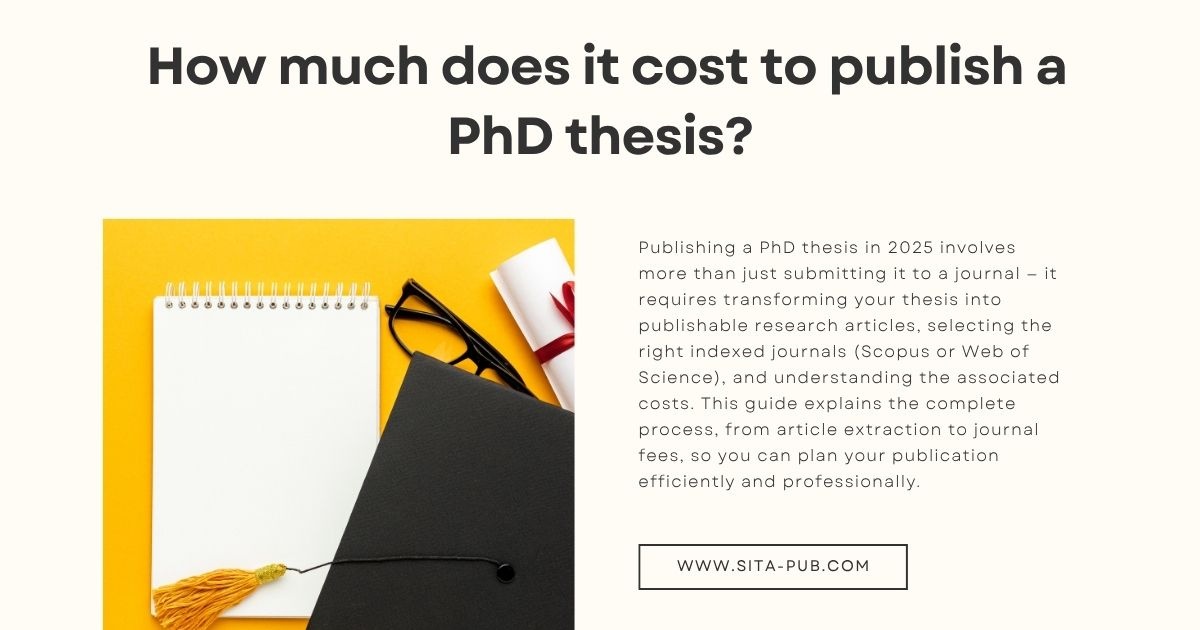How much does it cost to publish a PhD thesis? 2025 Complete Guide


A common misconception is that a PhD thesis can be submitted directly to a journal. This is not possible. Journals typically require concise, focused research articles rather than full theses. Therefore, your thesis must first undergo a structured process to extract publishable research articles. Only after this process can your work be considered for journal publication.
In this article, we will explain the complete process of publishing a PhD thesis, including article extraction, journal selection, costs.
Before considering journal fees, the first step is to prepare your thesis for publication. You need to convert your comprehensive thesis into well-structured research articles suitable for journals. While you can do this yourself at no cost, many researchers choose to use professional services, which typically charge 120–500 Euros per article, depending on complexity and field.
A thesis usually includes multiple chapters, exhaustive literature reviews, and extensive appendices, which are too long for most journals.
Journals expect articles to be focused, concise, and tailored to a single research question or study.
Extract one or more studies from your thesis that can be standalone articles.
Create a clear, concise, and research-oriented title.
The title should reflect the key research question, main results, or novelty of the study.
Example: Instead of “Sustainable Urban Development in Major Cities: A Case Study Approach,” consider “Evaluating Green Infrastructure Strategies for Sustainable Urban Development.”
The introduction for an article is more focused than a thesis introduction:
Start with brief context and relevance.
Summarize only the most critical literature related to the research question.
Clearly highlight the research gap.
End with the research aim and objectives, making it concise and aligned with journal requirements.
Extract the methods used for the specific study.
Include data collection techniques, experimental setup, and analytical methods.
Avoid unnecessary details like raw data tables or extended discussions that are more suitable for a thesis.
Present key findings in a concise manner.
Use figures, charts, and tables efficiently.
Focus only on the results that support the main research question of the article.
Compare your findings with existing studies in the literature.
Highlight the significance of results, practical applications, and future research opportunities.
Keep it focused to the scope of the article rather than the entire thesis.
Summarize the main contribution of the study.
Avoid repeating extensive details from the thesis.
State key takeaways and potential implications for the field.
Follow the citation style of the target journal (APA, IEEE, MLA, Chicago, etc.).
Only include references relevant to this particular article.
Once your article is ready, the next step is selecting the right journal. Most reputable journals accept papers derived from PhD theses, provided the work is original, well-written, and formatted according to their guidelines.
Decide whether you need a Scopus-indexed or Web of Science (WoS)-indexed journal.
Determine the quartile ranking (Q1, Q2, Q3, or Q4). Higher quartiles indicate higher impact but are more competitive.
Open Access Journals: Papers are freely available; usually involve article processing charges (APCs).
Subscription Journals: Access is restricted to subscribers; may have little or no publication fee.
Q1 journals may take 6–12 months due to rigorous peer review.
Q2–Q3 journals may publish in 3–6 months, depending on field and journal.
Q4 journals can sometimes publish within 1–3 months if the article meets formatting and technical criteria.
Higher quartile journals generally have higher APCs.
Typical APC ranges:
Q1 Open Access: 1000–2500 Euros
Q2: 700–1500 Euros
Q3: 500–1000 Euros
Q4: 300–800 Euros
Criteria | Options | Considerations |
Indexing | Scopus / WoS | Visibility and credibility |
Quartile | Q1–Q4 | Balance between impact and acceptance |
Access | Open Access / Subscription | Budget and audience reach |
Timeline | Fast-track / Normal | Align with graduation or promotion deadlines |
Fee | APC amount | Fits your budget for publication |
Tip: Always verify indexing and quartile using Scopus.com, SJR, or Web of Science Master Journal List to avoid journals falsely claiming to be indexed.
The cost to publish a PhD thesis depends on multiple components:
Article Extraction: 120–500 Euros per article (for professional services).
Journal APC Fees: Based on indexing, quartile, and open access.
Optional Professional Services:
Formatting & submission assistance: 100–300 Euros
Native English Editing: 150–400 Euros
Plagiarism checking and removal: 50–150 Euros

At SITA Academy, we provide comprehensive publication support services to make your PhD thesis ready for publication and guide you through the entire process.
Convert your thesis into multiple publishable articles.
Suggest titles, focus areas, and key points for each article.
Suggest journals based on topic, deadline, quartile, and budget.
Provide a curated list of Scopus and Web of Science–indexed journals.
Format your article according to journal guidelines (APA, IEEE, MLA, etc.).
Handle the entire submission process and communication with editors.
Improve grammar, clarity, and academic tone.
Increase the probability of acceptance.
Identify overlap with existing literature using Turnitin or iThenticate.
Rewrite or remove overlapping content to meet journal standards.
Guide you through reviewer comments, revisions, and resubmissions.
Coordinate with the journal until your article is published online.
Feature | Benefit |
Personalized journal matching | Receive journals aligned with topic, deadline, and budget |
Transparent publication process | Clear timelines, fees, and communication |
Expert academic support | Professional editors, reviewers, and advisors |
Time-efficient results | Fast, accurate, and guided support for all steps |
Send your PhD thesis to SITA Academy. We will extract publishable articles, recommend suitable journals, and provide full support throughout the publication process. Maximize your research impact and ensure timely publication.
Publishing a PhD thesis involves more than submission to a journal. The key steps include:
Extracting multiple articles from your thesis.
Preparing each article professionally.
Selecting the right journal based on indexing, quartile, open access, and fees.
Utilizing optional services such as formatting, editing, and plagiarism removal.
Professional guidance to avoid rejection and delays.
With careful planning and the right support, your research can reach a global audience efficiently and cost-effectively.
If you have any questions, inquiries, or would like to learn more about our services, please don't hesitate to reach out to us. Our dedicated team is ready to assist you.